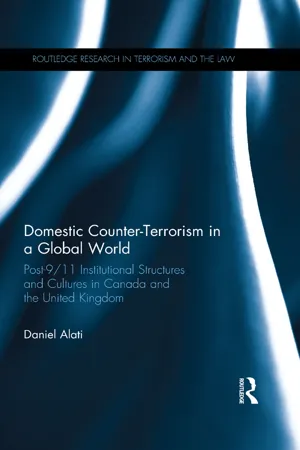1.1.1 Selection of jurisdictions
While there are many similarities and differences between Canada and the UK that make the jurisdictions particularly amenable to comparative analyses, there are unique nuances in the structures and cultures of the two countries that make for especially useful comparison. As noted, both countries responded swiftly to UN Security Council Resolution 1373 with sprawling and comprehensive legislation, despite the fact that both countries had provisions pertaining to terrorism on the books.5 Similarly, both jurisdictions have been criticized in the years following 9/11 for their reliance on immigration law in the fight against terrorism.6 Both jurisdictions operate under the common law and within Westminster-based parliamentary systems. That said, the key differences between the two jurisdictions can be categorized into four areas: legal structure, including rights adjudication systems in the two jurisdictions; political structure, including government type and mechanisms for parliamentary review; legal culture, including ideas among the judiciary pertaining to the appropriate level of deference in national security cases; and finally, political culture, including societal attitudes towards human rights in each jurisdiction, and relationships with powerful states such as the US. Each of these areas of difference is the focus of subsequent chapters, and each difference contains nuances that are connected to the overall argument of this book.
Comparisons of Canada and the UK’s legal structure focus on the operation of the Human Rights Act 19987 (HRA) in the UK, which gives effect to the European Convention on Human Rights8 (ECHR), and on the Canadian Charter of Rights and Freedoms in Canada.9 The Charter is a constitutionally entrenched Bill of Rights document that gives Canadian courts a formal power to strike down legislation, adjudicated at the highest level by the Supreme Court of Canada. To contrast, the HRA allows resort to the European Court of Human Rights (ECtHR) once adjudication in the domestic courts has been exhausted, with UK courts required to ‘take into account’ ECtHR jurisprudence.10 While Kavanagh has argued that the powers of the courts under these two systems ‘are not dissimilar’,11 others argue that the UK ‘form of legislation for human rights is not as strong as the Canadian model’.12 This difference in legal structure leads to two questions about its potential impact on the evolution of counter-terrorism measures: 1) How, and to what extent, are domestic legal decisions on counter-terrorism influenced by the structure of the rights adjudication systems in each jurisdiction? and; 2) How, and to what extent, do domestic legal structures allow for international legal instruments to impact domestic legal decisions on counter-terrorism?
Analyses of the political structure of Canada and the UK focus on the government types13 of the two countries over the last decade, and the systems for parliamentary review and oversight of counter-terrorism measures present in the two jurisdictions. ‘Government type’ is the term used by Conley to distinguish between minority (or coalition) and majority governments in his analysis of how institutional structures and governing contexts intersect to account for variation in legislative outcomes. Canada and the UK have both had experience of minority (or coalition) governments in the years since 9/11, albeit at different times, and there is much academic debate about how legislation may evolve differently under minority (or coalition) or majority governments.14 This leads to the following question for analysis: Has the existence of minority (or coalition) governments had an impact on the evolution of domestic counter-terrorism measures in the two jurisdictions? Moreover, a significant difference in the UK and Canada’s political structure is the comparative abundance of parliamentary oversight and review of counter-terrorism provisions in the UK and the glaring lack of these review mechanisms in Canada.15 This leads to the following question for analysis: How, and to what extent, have systems for parliamentary review and oversight of counter-terrorism measures had an impact on the evolution of domestic counter-terrorism measures in the two jurisdictions? Both of these questions contribute to analyses of how, and to what extent, differences in domestic political structure have an impact on the evolution of counter-terrorism measures in the two jurisdictions.
Analyses of the differences in legal culture between the two countries will focus on what judicial decisions in national security cases tell us about the judiciary’s role in these cases. This includes analyses of what judges in each country believe to be the appropriate levels of deference to the executive, and analyses of whether judicial decisions on national security provide evid...
